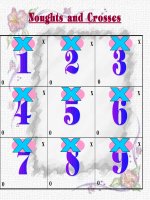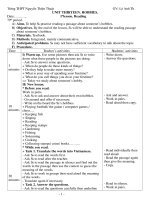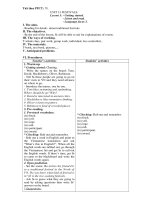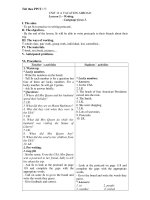UNIT 13
Bạn đang xem bản rút gọn của tài liệu. Xem và tải ngay bản đầy đủ của tài liệu tại đây (300.39 KB, 10 trang )
<span class='text_page_counter'>(1)</span><div class='page_container' data-page=1>
<b>UNIT 13: STORYTIME (4 Periods) </b>
<b>STARTER: </b>
<b>GRAMMAR SPOT: </b>
<b>Question forms: </b>
<i>Why/ Who/ Whose/ When/ Where/ What/ Which/ How many/ How much/ </i>
<i> How long/ How far/ How/ … </i>
Ex: - Why do you learn English?
- When were you born?
- Where do you live?
- Who do you live with?
- What do you have for dinner?
- Which film do you like best?
- How do you go to work?
- How many people are there in your family?
- How much sugar do you want?
- How far is it from your house to school?
<b>Adjectives and adverbs: </b>
- Adjectives describe nouns.
<i>This is a big dog. </i>
</div>
<span class='text_page_counter'>(2)</span><div class='page_container' data-page=2>
- Adverbs describe verbs.
<i>He ran quickly. </i>
<i>He drives too fast. </i>
<i><b>To form regular adverbs, add “-ly” to the adjective. Words ending in “-y”, change to “-ily”. </b></i>
<i> Adjective </i> <i>Adverb </i>
quick quickly
bad badly
careful carefully
immediate immediately
easy easily
- Some adverbs are irregular.
<i> Adjective </i> <i>Adverb </i>
good well
hard hard
early early
fast fast
<b>Prepositions: </b>
<i>What’s the story about? </i>
<i>What happens at the end of the story? </i>
<i>What’s on TV tonight? </i>
<b>A QUIZ: (p 98) </b>
<b>Question words: Storytime quiz </b>
<b>1. Look at the pictures on p98, 99. Which stories do you know? </b>
<b>2. Work in groups and answer the questions in the quiz. </b>
Answers: 1. b 2. They both die. They kill themselves.
3. b 4. c
</div>
<span class='text_page_counter'>(3)</span><div class='page_container' data-page=3>
9. Spanish 10. a
11. Because he tells lies.
12. a 13. b 14. b
<b>3. T13.1. Listen and check your answers. Listen carefully to the intonation of the </b>
<b>questions. </b>
<b>4. In groups, answer these questions. </b>
<b> </b>
<b>PRACTICE: ( p 99) </b>
<b>Questions and answers. </b>
<b>1. Look at the question words in A and the answers in C. Choose the correct question </b>
<b>from B. </b>
<b>Answers: </b> Where did you go? - To the shops.
</div>
<span class='text_page_counter'>(4)</span><div class='page_container' data-page=4>
Who did you go with? - A friend from work.
<b>T13.4. Listen and check. </b>
<b>Listening and pronunciation (p 99) </b>
<b>2. T13.5. Tick (√) the sentence you hear. </b>
Answers: 1. b 2. b 3. a 4. b
5. a 6. a 7. a
<b>Asking about you. </b>
<b>3. Put the words in the correct order to make questions. </b>
Answers: 1. Do you like learning English?
2. What did you do last night?
3. How many languages does your mother speak?
4. When did you go last shopping?
5. Which football team do you support?
6. Did you come to school by car today?
7. How much homework do you have?
8. Who do you usually sit next to in class?
9. Why do you want to learn English?
<b>4. Work with a partner. Ask and answer the questions. </b>
Ex: 1. A: Do you like learning English?
- B: Yes, I do.
2. A: What did you do last night?
- B: I watched TV.
3. A: How many languages does your mother speak?
- B: She speaks two languages.
4. A: When did you go last shopping?
</div>
<span class='text_page_counter'>(5)</span><div class='page_container' data-page=5>
<b>DO IT CAREFULLY! (p 100) </b>
<b>Adjectives and Adverbs. </b>
<i><b>1. Are the words in italics adjectives or adverbs? </b></i>
<b> </b>
Answers: <i>adjective. </i> <i>adverb. </i>
1. bad badly
2. careful carefully
3. easy easily
4. good well
5. hard hard
<b>2. Match the verbs and phrases with an adverb. Usually more than one answer is </b>
<b>possible. Which are the irregular adverbs? </b>
Ex: - Get up slowly/ quietly/ early/ quickly.
- Walk slowly/ quickly/ carefully.
<b>PRACTICE: (p 100) </b>
<b>Order of adjectives/ adverbs. </b>
<b>1. Put the adjective in brackets in the correct place in the sentence. Where necessary, </b>
<b>change the adjective to an adverb. </b>
</div>
<span class='text_page_counter'>(6)</span><div class='page_container' data-page=6>
We had a holiday in Spain, but unfortunately we had terrible weather.
2. Maria dances (good).
Maria dances well.
3. When I saw the accident, I phoned the police (immediate)
When I saw the accident, I phoned the police immediately.
<b>4. Don’t worry. Justin is a driver. (careful ) </b>
Don’t worry. Justin is a careful driver.
<b>Telling a story. </b>
<b>2. Complete these sentences in a suitable way. </b>
Answers: 1. It started to rain. Fortunately I had an umbrella.
2. Ali invited me to his party. Unfortunately I forgot it.
<b>3. T13.6. Listen to a man describing what happened to him in the middle of the night. </b>
<b>Number the adverbs in the order you hear them. </b>
Answers: 1. suddenly 2. slowly 3. carefully 4. quietly
5. immediately 6. really 7. fortunately <b>8. quickly </b>
<b>4. Work with a partner and tell the story again. Use the order of the adverbs to help </b>
<b>you. </b>
<b>Check it. </b>
<b>5. Correct the mistake in each sentence. </b>
Answers:
1. Where does Anna’s sister live?
2. The children came into the classroom noisily.
3. What does “comb” mean?
4. I always work hard.
5. Can you help me, please?
6. When is Peter going on holiday?
</div>
<span class='text_page_counter'>(7)</span><div class='page_container' data-page=7>
<b>VOCABULARY: (p101) </b>
<b>Describing feelings. </b>
<b>1. Match the feelings to the pictures. </b>
Answers: a. excited b. annoyed c. worried
d. bored e. tired <b>f. interested </b>
<b>2. Match the feelings and reasons to make sentences. </b>
<b>Answers: </b> 1. I am bored because I have nothing to do.
2. I am tired because I worked very hard today.
3. I am worried because I can’t find my keys.
4. I am excited because I’m going on holiday tomorrow.
5. I am annoyed because I want to go to the party but I can’t.
6. I am interested because we have a good teacher.
<b>3. Complete each sentence with the correct adjective. </b>
Answers: 1. exciting/ excited 2. tired/ tiring
3. annoyed/ annoying 4. worrying/ worried
<b>4. Answer your teacher’s questions using adjectives from exercises 1 and 2. </b>
<b>READING AND LISTENING: (p 102) </b>
<b>A short story. </b>
<b>1. Do you give presents at Christmas? What are some of the best/ worst presents you </b>
<b>have given or received? </b>
Did you like doing exercise 2?
No, we didn’t. It was very boring!
How did you feel?
</div>
<span class='text_page_counter'>(8)</span><div class='page_container' data-page=8>
<b>2. Work with a partner. Look at the pictures. Where and when does the story take </b>
<b>place? Who do you think the people are? </b>
<b>3. T13.7. Read and listen to part one of the story. </b>
<b>4. Answer the questions. </b>
Answers: Bài 4:
1. Where does Della live?
She lives in a poor little room in New York.
2. Is she married?
Yes, she is.
3. What’s her job?
She’s a housewife. There is no work for Della.She is unemployed.
4. What time of year is it?
It is in the winter – It’s the Christmas time.
5. What does she want to do for Jim?
She wants to buy Jim a Christmas present - something really good to show how much she
loves him.
6. Why do you think she is going into town? What is she going to do?
Because she doesn’t have enough money to buy Jim a Christmas present. She’s going to sell
her hair to buy him a Christmas present.
7. Which of these adjectives best describe Della? Why?
Sad and worried best describe Della because she doesn’t know if she has enough money to buy
Jim a present and how Jim is when he sees her with short hair.
<b>5. T13.8. Read and listen to part two. </b>
<b>6. Answer the questions. </b>
Answers:
1. Where did Della go? What did she do? Did you guess correctly?
She went into town. She sold her hair. Yes, I did.
2. How much money does she have for Jim’s present?
$21.
3. What does she buy for him? Why?
A gold watch chain. Because Jim loves his watch, but it doesn’t have no chain.
</div>
<span class='text_page_counter'>(9)</span><div class='page_container' data-page=9>
She thinks that her hair looks like a schoolboy.
5. What does Jim think of her hair?
I think Jim is very sad.
6. Which of these adjectives best describe Della? Why?
Worried best describe Della because she doesn’t know if Jim agees what she did.
<b>7. How do you think the story is going to end? Discuss your ideas with the class. </b>
<b> Read part three on p104 and check your ideas. </b>
<b>8. T13.9. Read and listen to part three. </b>
<b>9. Answer the questions. </b>
Answers: 1. He thinks that her hair doesn’t matter if it’s long or short.
2. Yes, she does.
3. She bought a gold watch chain for Jim, but he sold the gold watch to buy
a comb for her.
4. The best present of all is love.
<b>Language work. </b>
<b>10. Put some adjectives and adverbs from the story into the correct box. </b>
<i><b>Adjectives </b></i> <i><b>Adverbs </b></i>
poor
worry
lucky
sad
good
beautiful
lovely
suddenly
…
really
carefully
quietly
sadly
quickly
</div>
<span class='text_page_counter'>(10)</span><div class='page_container' data-page=10>
<b>11. Write questions about the story using these question words. Ask and answers the </b>
<i><b>questions across the class: When/ How much/ What/ Why/ Where/ How. </b></i>
<b>WRITING: Writing a story p124 - Using adjectives and adverbs. </b>
<b>EVERYDAY ENGLISH: (p 105) </b>
<b>At the chemist’s </b>
<b>1. Match a word in the box with a picture. Write the words in the correct column. </b>
Answers:
<i><b>Things for </b></i>
<i><b>your hair </b></i>
<i><b>Things for </b></i>
<i><b>your teeth </b></i>
<i><b>Things for </b></i>
<i><b>your skin </b></i>
<i><b>Things for </b></i>
<i><b>your health </b></i>
a comb
shampoo
conditioner
a toothbrush
toothpaste
sun cream
deodorant
soap
aspirin
plasters
<b>2. T13.10. Listen and complete the conversation at the chemist’s. </b>
Answers: 1. feeling 2. looking 3. where 4. size
5. large 6. ‘d like 7. kind 8. which
9. Anything 10. How much 11. There 12. change
<b>3. With your partner, make more conversations in the chemist’s. Use the words in </b>
<b>exercise 1. </b>
</div>
<!--links-->









